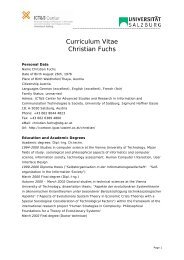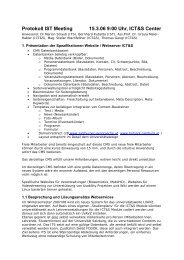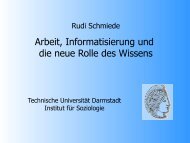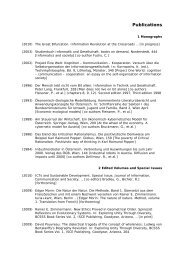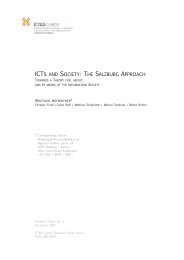CHRISTIAN FUCHS - ICT&S - Universität Salzburg
CHRISTIAN FUCHS - ICT&S - Universität Salzburg
CHRISTIAN FUCHS - ICT&S - Universität Salzburg
You also want an ePaper? Increase the reach of your titles
YUMPU automatically turns print PDFs into web optimized ePapers that Google loves.
Christian Fuchs: Social Networking Sites and the Surveillance Society6. Integrated Social Networking Sites (ISNS): Research MethodSpecific research that has been conducted on ISNS include: appearance andattractiveness on Facebook (Tom Tong et al. 2008, Walther et al. 2008), business andpolicy implications of SNS and other “participatory Web and user-generated content“(OECD 2007), effects of MySpace and YouTube on election campaigns (Gueorguieva2008), factors that influence privacy settings (Lewis/Kaufman/Christiakis 2008),friendship (boyd 2006a), gender (Magnuson/Dundes 2008, Cohen/Shade 2008),implications for libraries (Charnigo/Barnett-Ellis 2007, Harris/Lessick 2007), languageuse (Carroll 2008, Herring et al. 2007), media theory (Beer 2006), medical education(Ferdig et al. 2008, McGee/Begg 2008, Thompson et al. 2008), music culture (Baym2007, Beer 2008a), pharmacy education (Cain 2008), place and identity(Goodings/Locke/Brown 2007), psychological distress (Baker/Moore 2008), researchethics (Moreno/Fost/Christakis 2008), self-esteem and sociability (Zywica/Danowski2008), SNS as virtual learning environments (Mitchell/Watstein 2007) and their role ineducation (Mazer/Murphy/Simonds 2007), studies of specific users such as AfricanAmericans (Byrne 2007) or the Korean site Cyworld (Kim and Yun 2007, Haddon andKim 2007), taste performance (Liu 2007), teenage life (boyd 2008b), the blurring ofpublicness and privatness (Lange 2007), the rise of marketing relationships on ISNS aschallenge for public relations (Meadows-Klues 2008), or work skills (Bernardo 2007).Corporate and state surveillance has thus far not been an issue in ISNS research. Mostspecific studies operate on the micro level of analysis and do not focus on the critiqueof coercive and repressive totalities, i.e. macro contexts. Therefore our study is differentfrom most other studies that have thus far been carried out because it focuses on howeconomic and political macro contexts shape ISNS and it critically analyzes andquestions these influences.We conducted an empirical case study on the relationship of surveillance society andISNS usage by students in <strong>Salzburg</strong>. The research was carried out from October toDecember 2008. The questionnaire was available for 50 days to the students. The basicresearch questions were:(1) What do students consider as the greatest opportunities of ISNS?(2) What do students consider as the greatest risks of ISNS?(3) How knowledgeable are students of the rise of a surveillance society?(4) How critical are students of the rise of a surveillance society?(5) How does the degree of knowledge about surveillance and the degree of criticalconsciousness on surveillance influence the usage of social networking sites?We constructed a questionnaire that consisted of 35 (single and multiple) choicequestions, 3 open-ended questions, and 5 interval-scaled questions. The questionnairewas implemented as an electronic survey with the help of the online tool SurveyMonkey. Our potential respondents were students in <strong>Salzburg</strong>. In order to reach them,we sent out invitations to participate with the help of the University of <strong>Salzburg</strong>’seLearning platform Blackboard, we asked local online platforms that are frequentlyused by students in <strong>Salzburg</strong> to post invitations to their platforms and to send outnewsletters (http://www.unihelp.cc, http://www.salzburg24.at, http://www.where2be.at,http://www.salzblog.at). We also posted invitations to all discussion groups on studiVZ,45



